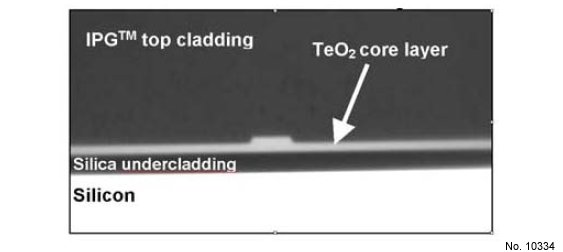
Alphabetical Index
Browse by Elements
Keyword Search
Dry Etchants
Dry and Wet Etchants
Wet Etchants
Bulk Etchants
Layer Etchants
Nano Etchants
Single Crystal Etchants
Thin Film Etchants
Thin Foil Etchants
Wafer Etchants
Al Etchants
Cd Etchants
Ga Etchants
Ge Etchants
In Etchants
New Etchants
Other Etchants
Si Etchants
Zn Etchants
Help
Home
Tellurium Dioxide (TeO2) - Dry Etching
Material Name: Tellurium Dioxide
Recipe No.: 10334
Primary Chemical Element in Material: Te
Sample Type: Layer
Uses: Etching
Etchant Name: None
Etching Method: Dry etching
Etchant (Electrolyte) Composition: The final etching conditions were 30 sccm H2, 5 sccm CH4, 30 sccm Ar, 30 mT pressure,
150W RF power, and the rib was etched 0.8 microns deep. Post etch resist removal was
accomplished by an oxygen plasma strip to avoid damaging the TeO2 surface. The
waveguides were then clad with a 15 µm thick film of UV cured inorganic polymer glass
(RPO Pty Ltd, IPG) which has a refractive index of 1.509 at 1550 nm. End facets were then
hand cleaved on the waveguides with a diamond scriber. The resulting waveguide chips were
7.8 cm long.
Procedure (Condition): No data
Note: We report on the fabrication and optical properties of the first
very low loss nonlinear Tellurite planar rib waveguides ever demonstrated.
A new reactive ion etch process based on Hydrogen as the active species
was developed to accomplish the low propagation losses. Optical losses
below ~0.05 dB/cm in most of the NIR spectrum and ~0.10 dB/cm at
1550 nm have been achieved - the lowest ever reported by more than an
order of magnitude and clearly suitable for planar integrated devices. We
demonstrate strong spectral broadening of 0.6 ps pulses in waveguides
fabricated from pure TeO2, in good agreement with simulations.
Reference: S. J. Madden, K. T. Vu, Very low loss reactively ion etched Tellurium
Dioxide planar rib waveguides for linear and non-linear optics, 28 September 2009 / Vol. 17, No. 20 / OPTICS EXPRESS 176450-17651.

Figure 1: Optical micrograph of cleaved finished waveguide in the 1.6 µm thick Tellurite film.